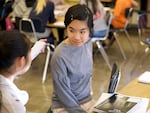
Class of 2025 students Austin and Anna at their grandma's house on March 19, 2025.
Mia Estrada / OPB
Anna and Austin have grown up together as cousins and classmates, and have been part of OPB’s Class of 2025 since first grade. Until junior year of high school, the cousins went to the same school, in the same Southeast Portland school district.
They’re strong students, and come from a big Vietnamese family with a lot of cousins. Growing up, Anna and Austin spent a lot of time at their grandma’s house.
“My grandma, I don’t like doing homework, but she makes us do it,” Austin told OPB back in fifth grade. “But it really pays off for us when the school year starts ‘cause we’re already used to doing a lot of homework at home … 25 pages in the morning. 25 pages in the afternoon.”
OPB’s Class of 2025 project started from a goal set by former Gov. John Kitzhaber that by 2025, 100% of Oregon students would be graduating from high school. Kitzhaber also set goals around college completion, to increase the percentage of Oregonians with two- and four-year degrees.
As Anna and Austin get ready to graduate in June, college is their next step. But they took different paths to get there, with different factors in the decision about where to go to college, or what to study.
“I don’t know what I’m doing next year,” Anna said at the end of junior year. “I don’t know what I’m doing in the future. I don’t know what I’m doing for college.”
Related: Class of 2025 starts its last year of high school
Anna always expected college to be part of her future plans, but she wasn’t sure what she’d study. In high school, she loved art. She showed her work at the art show, and she tried her hand at many different media — from photography and calligraphy to drawing and painting.
“[Art] lets me express my emotions,” Anna said. “It’s just something fun that I do that helps me connect with people and with myself.
Still, she wasn’t sure about art as a career choice.
Austin, her cousin, has long been interested in airplanes. Like many of the students in OPB’s Class of 2025 project, Austin’s answers to the question “what do you want to be when you grow up?” changed over time. At first, it was the military, maybe being a pilot. At one point, he was interested in being a personal trainer. By high school, he was back to planes — only this time, the focus was on engineering, and specifically aerospace engineering.
“I’ve always loved airplanes as a little kid, and it’s just like, ‘How can I incorporate that into a way where I could enjoy while also making a living?’” Austin said.

Class of 2025 students Anna, front, and Austin, front, in blue, with their families during a home visit in first grade. Anna and Austin are cousins, and OPB has followed their educational journey for 13 years.
Amanda Peacher / OPB
School’s — and family’s — influence
At the beginning of senior year, Anna was planning on attending a community college to keep higher education affordable. She didn’t attend the college rep visits or other events her school, David Douglas High School, held for students.
It wasn’t until late last year when her uncle suggested she instead look at four-year programs.
“He actually told me to apply to every college in Oregon and Portland,” she recalled.
“I kind of struggle taking the initiative, so I appreciate the help of like, ‘Here’s some things you should do’ … I was wholly unprepared, so having someone tell me what to do helped me a lot.”
She zeroed in on engineering, and applied to one school: Oregon State University. It’s where she and Austin will be freshmen next fall.
“Now that I’ve made a choice, I think that I’m more, I have a plan now,” Anna said in spring of senior year.
“I have something that I’m working towards, so I feel like I’m not lost anymore.
Anna said her high school didn’t feel proactive in helping students plan for college, but that’s not exactly unique to David Douglas.
A February report from the Oregon Department of Education found that there’s a disparity of more than 20 percentage points between the number of students who want to enroll in college and the number who actually end up going. The gap is even larger for Black, Latino, Pacific Islander and other student groups.
Related: Telling the Class of 2025’s story since 2012
An anonymous student quoted in the report said more support from school staff could be helpful.
“I wish our counselors put more work into guiding us about college and scholarships,” the Oregon student shared. “I feel like I don’t know where I’m supposed to start at all.”
Austin is a senior at Adrienne C. Nelson High School, a relatively new school amid the suburban subdivisions of Happy Valley. There, Austin felt a strong emphasis on making plans for college.
“They really tend to push the college future,” Austin said. “Most of my English classes, I remember last year and this year, they were talking about a lot of letters of rec … how to sign up for FAFSA, just a lot of steps that you would need in order to apply to college.”
New Oregon graduation requirements may help level the higher education playing field — ad get every student thinking more about the future while they’re still in high school. Starting with the Class of 2027, high school students will be required to learn about higher education and career skills in order to graduate.
The digital story was written by Elizabeth Miller. The audio story was produced by Mia Estrada.
Listen to all episodes of The Evergreen podcast here.




